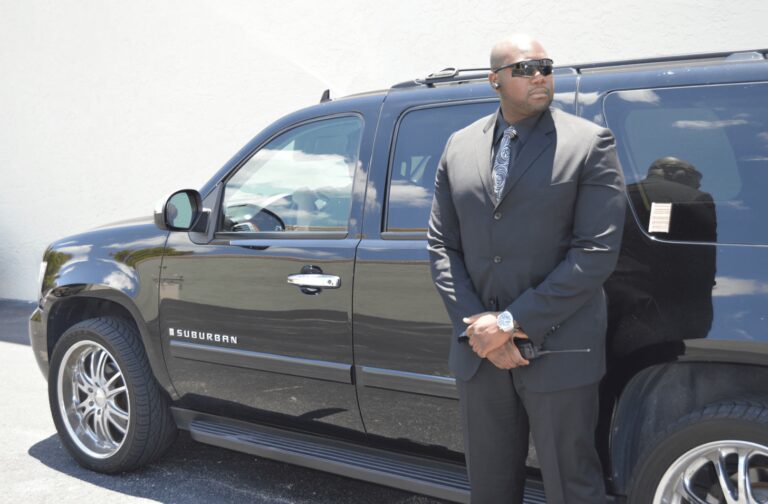Table of Contents
Have you ever wondered what it takes to become an elite executive protection agent? Walking the red carpet with celebrities, keeping presidents safe from potential danger, and ensuring the highest level of security for high-profile individuals is no easy feat.
In this blog, we’ll explore the qualifications and answer the age-old question: what does it take to be an executive protection agent?
What are the Qualifications Needed to Become an Executive Protection Agent?
Executive protection agents, sometimes referred to as bodyguards, provide protection for people in high-risk positions. In order to become a professional executive protection agent, an individual must possess a special set of skills and have certain qualifications.
The minimum qualifications that must be met in order to become an executive protection agent vary by country; however, the most common qualifications include:
- A valid driver’s license and/or clean driving record.
- Previous experience with law enforcement or military bodyguard training is preferred.
- Strong written and verbal communication skills are essential.
- Proficiency in physical self defense techniques such as martial arts is highly advantageous.
- Familiarity with firearms and other weapons is also beneficial but may be taught during certain education programs.
- Excellent physical fitness is important for the job, so applicants must pass a fitness test or show proof of active participation in a fitness program.
- Having first aid training certification is also helpful as it demonstrates that applicants have firsthand knowledge of medical scenarios should they arise on the job.
In addition to these minimum requirements, other qualifications that can benefit prospective agents include: possessing college degrees in criminal justice or safety management; completing courses related to investigative skills, personal and corporate security; having previous experience in corporate risk security; being well versed with personal computer software; being highly organized; having infiltration skills; being able to act decisively during dangerous situations; remaining calm under pressure; and having knowledge of travel protocols such as passport applications process and international customs regulations.
Education Requirements

Education requirements for executive protection agents vary, but many employers prefer candidates with at least a high school diploma and experience in a related field such as law enforcement or the military. However, some employers may be willing to consider applicants with a GED if they have extensive related experience.
In addition to meeting the educational requirement, successful executive protection agents must also possess core qualifications including strong physical fitness and excellent communication, interpersonal, and problem-solving skills. They must also have an excellent knowledge of security procedures and protocol, strong knowledge of defensive driving techniques, first aid training and weapons training. In some cases, employers may require executive protection agents to obtain additional certifications such as advanced bodyguard training or hazardous materials training.
Physical Requirements

To become an executive protection agent, applicants must meet certain physical requirements. The typical qualifications for this role include:
- A valid driver’s license
- The ability to lift up to 80 lbs
- The ability to run a mile in 9 minutes or less
- Excellent vision and hearing acuity (with or without corrective lenses and/or devices)
- The ability to respond quickly in an emergency situation
- The ability to maintain physical capability and endurance necessary to defend clients if attacked
In order to guarantee the safety of the person being protected, agents must also stay fit and maintain training throughout their career. Qualified applicants may go on to obtain further certifications in executive protection areas upon meeting physical fitness requirements.
Psychological Requirements
In addition to knowledge, skills, and abilities related to security measures, executive protection agents must possess certain psychological qualifications that demonstrate they are capable of effectively responding to potentially dangerous situations. Essential psychological requirements for becoming an executive protection agent include:
- The ability to remain calm in stressful environments.
- Excellent judgment and decision-making skills.
- Superior communication and interpersonal skills.
- Keen observation and awareness capabilities.
- A professional demeanor at all times.
- Assertiveness when necessary.
- The willingness to accept responsibility for completing tasks within specific timelines.
- An understanding of emergency medical procedures in case of injury or illness on the job site.
- The ability to analyze current situations quickly and accurately assess the potential risks posed by their environment to those they protect.
Technical Requirements

Besides the commitment to truly guarding clients and having the proper ethical standards, becoming an executive protection agent also requires specific technical qualifications. Although the exact requirements may vary depending on the agency, there are three main plus points that many employers will look for:
- First Aid Certification: Being able to provide initial treatment in case of a minor injury or illness is important for any executive protection agent. A Senior First Aid Certificate will usually suffice, although some employers require higher levels of qualifications such as a Diploma or Advanced Life Support Provider.
- Licensing Requirements: Different countries and states have varying requirements when it comes to licensing within the security sector. Generally, an executive protection agent is expected to hold an active private investigator license as well as a firearms license if they are assigned to carry firearms while on duty.
- Defensive Driving Certification: All executive protection agents must be able to quickly navigate through populated areas in order to ensure their client’s safety and well-being. Prospective employees should have certificates that show they were trained in defensive driving processes and techniques like evasive maneuvering, speed control and skid reduction with both light vehicles and limousines/SUVs.
Other Qualifications

Along with possessing the physical attributes and qualifications necessary to handle various protection-related operations, Executive Protection Agents must have a combination of practical skills to be successful in their jobs. These other qualifications include:
- The ability to think and operate quickly and efficiently in stressful situations.
- Excellent interpersonal, communication and problem solving skills.
- A knowledge of the laws surrounding personal protection for both the public and private sectors.
- An understanding of security networks and systems.
- Proficiency in utilizing safety equipment.
- Experience working collaboratively with clients, colleagues, experts and other related personnel.
- Familiarity with investigative research techniques.
- Capacity for creating prevention strategies for high risk situations as well as identifying potential threats before they arise.
Conclusion
While the exact qualifications to become an executive protection agent varies depending on the sector and geographical location, there are some common core requirements. Executive protection agents should possess an appropriate law enforcement or security license, extensive experience and training in threat assessment, investigative techniques, surveillance procedures and defensive tactics. Applicants must be physically fit with keen observation skills to identify potential threats and immediate responses for protecting protected persons.

